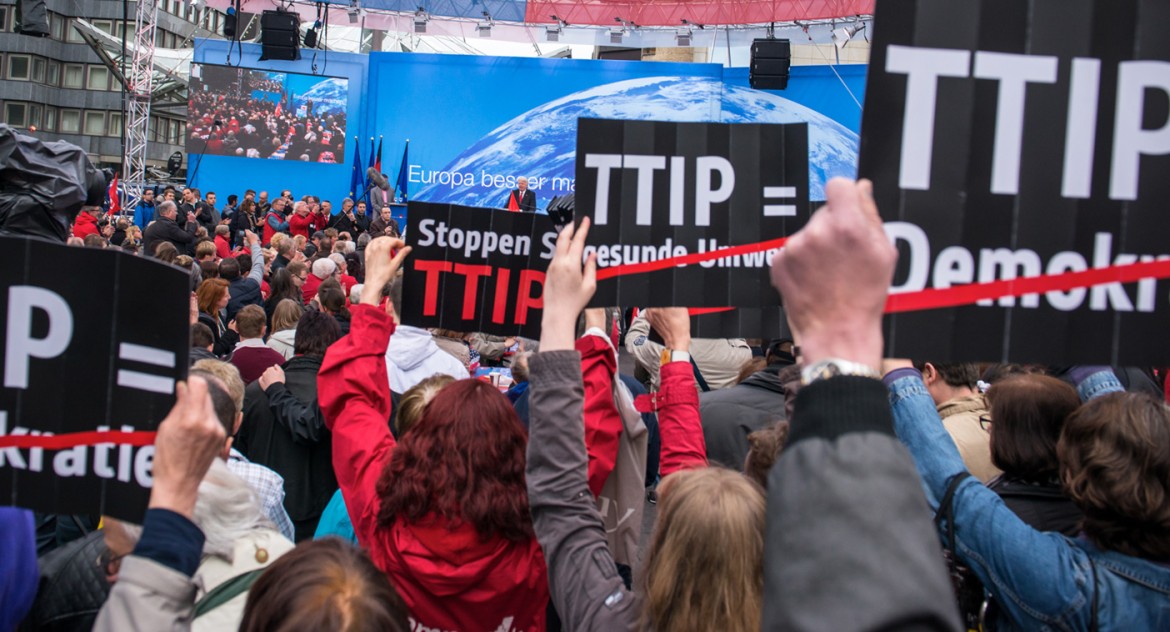Analysis
U.S. wants to restart TTIP negotiations
The American secretary of commerce cited data from a right-wing think tank and pointed out that the U.S. has never technically withdrawn from secret trade talks with Europe.

The American Commerce Secretary Wilbur Ross has re-launched negotiations for the TTIP, the free trade agreement between the U.S. and Europe. During an interview with CNBC, he specified: “It’s no mistake that, while we withdrew from TPP [a similar free trade treaty with Asian countries except China] we did not withdraw from TTIP.”
This is a resumption of negotiations that, shortly before Trump’s election, were considered “failed.” One of the first shocks to optimism was Brexit. Then German Economy Minister and Vice Chancellor Sigmar Gabriel, who considered the negotiations at a standstill, stepped in and stressed the need for Europe to safeguard its economies from excessive American demands. French Prime Minister Valls asked for a break in consultations.
That’s when Merkel tried to defuse the problem by recalling the importance of the agreement. Actually, this had already been underlined by the European negotiators and the determination of the United States in trying to impose its own conditions (especially in regards to big data, rather than the other purely commercial matters).
Even without the strong German and French words, only a few countries (Italy, for example) seemed to have confidence in the secret agreement that marginalized individual European countries, which were called upon only to ratify the decisions made behind closed doors in Brussels and Washington.
Ross’ words are not original. In April, during the visit of E.U. Trade Commissioner Cecilia Malmström to the U.S., Ross declared to the Financial Times that “The three big [economies] that are the sources of our trade deficit outside of [the North American Free Trade Agreement] are China, Japan and Europe.” Thus, he responded to the E.U. Commissioner who had gone to the U.S. in search of answers about the resumption of negotiations. With this statement, Ross opened a new window of opportunity, although with a huge caution: Washington seemed intent on waiting for the elections in Germany, and the E.U. seemed to fear the impact on public opinion of a negotiation with Trump, widely unpopular in Europe.
According to some, Ross’ words on Wednesday, however, constitute an attempt to mend relations after Trump’s allegations against the Germans about the trade balance with Washington. In his favored media, the president tweeted about what he called a “MASSIVE” deficit, accusing Germany of paying “FAR LESS than they should on NATO & military.”
In 2016, the U.S. had a trade deficit of nearly $65 billion with Germany, $3 billion less than with Japan and $2 billion more than with Mexico. It’s nowhere near the $347 billion trade deficit the U.S. has with China, which Trump has been working on, closing some contracts with Xi Jinping.
And the trade deficit of the United States with Europe — $146.3 billion in 2016 and year to date is $32.1 billion — may have pushed Ross to remember the need for a global agreement with the European Union.
It would not be a revision of Trump’s isolationist and protectionist position, because Ross showed off to CNBC the commercial deficit data supplied by the Coalition for a Prosperous America, a think tank whose mission is “to fight for balanced trade and to protect U.S. sovereignty.”
Moreover, during the rest of the interview, Ross also talked about some technical aspects of the need to start talking again about the TTIP. He said: “The E.U. is one of our largest trading partners, and any negotiations legally must be conducted at the E.U. level and not with individual nations. Thus, it makes sense to continue TTIP negotiations and to work towards a solution that increases overall trade while reducing our trade deficit.”
Originally published at https://ilmanifesto.it/gli-usa-provano-a-resuscitare-il-ttip-nostra-priorita-e-leuropa/ on 2017-06-01
